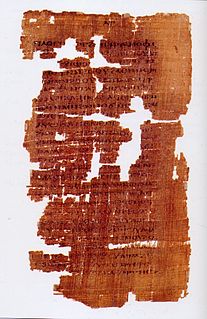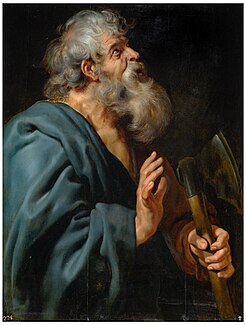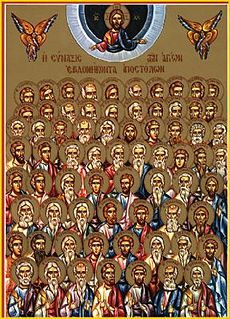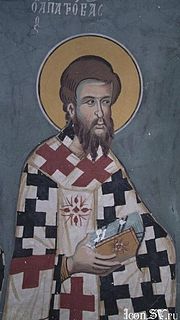Related Research Articles

Barnabas, born Joseph (Ἰωσήφ) or Joses (Ἰωσής), was according to tradition an early Christian, one of the prominent Christian disciples in Jerusalem. According to Acts 4:36, Barnabas was a Cypriot Jew. Named an apostle in Acts 14:14, he and Paul the Apostle undertook missionary journeys together and defended Gentile converts against the Judaizers. They traveled together making more converts, and participated in the Council of Jerusalem. Barnabas and Paul successfully evangelized among the "God-fearing" Gentiles who attended synagogues in various Hellenized cities of Anatolia.

The Gospel of Barnabas is a non-canonical gospel. It is a book depicting the life of Jesus, which claims to be by the biblical Barnabas who in this work is one of the twelve apostles. Two manuscripts are known to have existed, both dated to the late 16th or early 17th centuries, with one written in Italian and the other in Spanish, its text surviving only in a partial 18th-century transcript. Barnabas is about the same length as the four canonical gospels put together, with the bulk being devoted to an account of Jesus' ministry, much of it harmonized from accounts also found in the canonical gospels. In some key respects, it conforms to the Islamic interpretation of Christian origins and contradicts the New Testament teachings of Christianity.

Matthias was, according to the Acts of the Apostles, chosen by the apostles to replace Judas Iscariot following the latter's betrayal of Jesus and his subsequent death. His calling as an apostle is unique, in that his appointment was not made personally by Jesus, who had already ascended into heaven, and it was also made before the descent of the Holy Spirit upon the early Church.
Quintus Smyrnaeus was a Greek epic poet whose Posthomerica, following "after Homer" continues the narration of the Trojan War. The dates of Quintus Smyrnaeus' life and poetry are disputed: by tradition, he is thought to have lived in the latter part of the 4th century AD, but early dates have also been proposed.

The Epistle of Barnabas is a Greek epistle written between AD 70 and 132. The complete text is preserved in the 4th-century Codex Sinaiticus, where it appears immediately after the New Testament and before the Shepherd of Hermas. For several centuries it was one of the "antilegomena" ("disputed") writings that some Christians looked on as sacred scripture, while others excluded them. Eusebius of Caesarea classified it as such. It is mentioned in a perhaps third-century list in the sixth-century Codex Claromontanus and in the later Stichometry of Nicephorus appended to the ninth-century Chronography of Nikephoros I of Constantinople. Some early Fathers of the Church ascribed it to the Barnabas who is mentioned in the Acts of the Apostles, but it is now generally attributed to an otherwise unknown early Christian teacher. It is distinct from the Gospel of Barnabas.

The seventy disciples or seventy-two disciples, known in the Eastern Christian traditions as the seventy apostles or seventy-twoapostles, were early emissaries of Jesus mentioned in the Gospel of Luke. The correct Greek terminology is evdomikonta (εβδομήκοντα) apostoli or evdomikonta mathetes.

Saint Dorotheus bishop of Tyre is traditionally credited with an Acts of the Seventy Apostles, who were sent out according to the Gospel of Luke 10:1.

June 4 - Eastern Orthodox Church calendar - June 6
The see of Tyre was one of the most ancient dioceses in Christianity. The existence of a Christian community there already in the time of Saint Paul is mentioned in the Acts of the Apostles. Seated at Tyre, which was the capital of the Roman province of Phoenicia Prima, the bishopric was a metropolitan see. Its position was briefly challenged by the see of Berytus in the mid-5th century; but after 480/1 the metropolitan of Tyre established himself as the first (protothronos) of all the metropolitans subject to the Patriarch of Antioch.
Dorotheus or Dorotheos is a male given name from Greek Dōrótheos (Δωρόθεος), meaning "God's Gift", from δῶρον (dōron), "gift" + θεός (theós), "god". Its feminine counterpart is Dorothea, (Dorothy). Theodore means the same, with the root words in reverse order. The earliest form of the word δῶρον is the Mycenaean Greek do-ra, meaning "gifts", written in Linear B syllabic script; the feminine form Theodora is also attested in Linear B as 𐀳𐀃𐀈𐀨, te-o-do-ra.
Philemon was an early Christian in Asia Minor who was the recipient of a private letter from Paul of Tarsus. This letter is known as Epistle to Philemon in the New Testament. He is known as a saint by several Christian churches along with his wife Apphia. Philemon was a wealthy Christian and a minister of the house church that met in his home.
Pertinax was Bishop of Byzantium from 169 until his death in 187. Information on his life is mainly drawn from the works of Dorotheus of Tyre, according to whom he was originally a senior officer of the Roman Empire based in Thrace. He contracted a strong bout of some disease, and in the midst of his illness he had heard the rumors of miracles occurring amongst the adherents of a new growing religion – Christianity. He sought advice from Bishop Alypius of Byzantium; when his disease was cured, he believed it was the result of Alypius' prayers and the grace of God, and converted to Christianity. Shortly afterwards, he was ordained a priest by Alypius, and succeeded him as bishop after his death, a position he would serve to his own repose.
The Persian Empire, including modern Lebanon, eventually fell to Alexander the Great, king of Macedonia. He attacked Asia Minor, defeated the Persian troops in 333 BC, and advanced toward the Lebanese coast. Initially the Phoenician cities made no attempt to resist, and they recognized his suzerainty. However, when Alexander tried to offer a sacrifice to Melqart, Tyre's god, the city resisted. Alexander besieged Tyre in retaliation in early 332 BC. After seven months of resistance, the city fell, and its people were sold into slavery. Despite his early death in 323 BC, Alexander's conquest of the eastern Mediterranean Basin left a Greek imprint on the area. The Phoenicians, being a cosmopolitan people amenable to outside influences, adopted aspects of Greek civilization with ease.

Aristobulus of Britannia is a Christian saint named by Hippolytus of Rome (170–235) and Dorotheus of Gaza (505–565) as one of the Seventy Disciples mentioned in Luke 10:1–24 and as the first bishop in Roman Britain.

Parrobus of Pottole, sometimes Patrobos, Patrobus or Patrobas, is numbered among the seventy disciples. He was Bishop of Neapolis (Naples) or of Pottole, and is referred to in Scripture when St Paul greets him in his Epistle to the Romans. The Church remembers St. Patrobas on November 5, with his fellow apostles Ss. Hermas, Linus, Gaius and Philologos.

Dark Shadows is a 2012 fantasy comedy horror film based on the gothic television soap opera of the same name. It was directed by Tim Burton and stars Johnny Depp, Michelle Pfeiffer, Helena Bonham Carter, Eva Green, Jackie Earle Haley, Jonny Lee Miller, Chloë Grace Moretz, and Bella Heathcote in a dual role. Christopher Lee has a small role in the film, his 200th film appearance and fifth and final appearance in a Burton film, and Jonathan Frid, star of the original Dark Shadows series, makes a cameo, which was his final screen appearance, as he died shortly before the release of the film. One of the film's producers was Richard D. Zanuck, who died two months after its release.

Acts 12 is the twelfth chapter of the Acts of the Apostles in the New Testament of the Christian Bible. It records the death of the first apostle, James, son of Zebedee, followed by the miraculous escape of Peter from prison, the death of Herod Agrippa I, and the early ministry of Barnabas and Paul of Tarsus. The book containing this chapter is anonymous, but early Christian tradition uniformly affirmed that Luke composed this book as well as the Gospel of Luke.

The Vision of Dorotheus or Dorotheos is an autobiographical Homeric Greek poem, composed in 343 lines of dactylic hexameter and attributed to "Dorotheus, son of Quintus the Poet". The poem chronicles a vision, wherein the author is transported to the Kingdom of Heaven and finds himself in its military hierarchy. He is conscripted into and deserts his post, only to receive punishment, be forgiven, and rediscover his Christian faith. The poem, penned sometime in the 4th-century, depicts the Kingdom of Heaven in an Imperial fashion; Christ is enthroned as emperor, surrounded by angels bearing Roman military and official titles, with the military structures of the Kingdom of Heaven modelled on those of Rome.
Patriarch Joachim V was Greek Orthodox Patriarch of Antioch from 1581 to 1592.
Saint Dorotheus may refer to:
References
- ↑ James C. Paget (1994). The Epistle of Barnabas: Outlook and Background. Mohr Siebeck. pp. 32–. ISBN 978-3-16-146161-3 . Retrieved 13 November 2012.